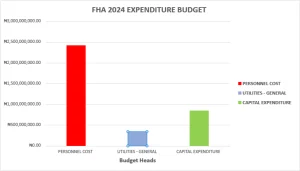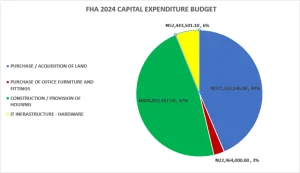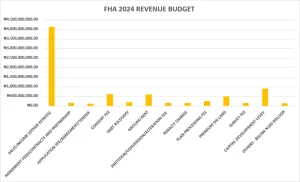The Federal Housing Authority (FHA) intends to allocate about N776.15 million for land procurement and house construction, constituting roughly 19.8% of its total 2024 budget of N3.94 billion.
The budget for acquiring land and constructing houses is about 91.1% of the agency’s capital expenditure (N851.56 million).
The remaining 8.9% will be spent on IT systems (N52.44 million) and office equipment/furniture (N22.96 million).
Despite its critical role in addressing housing needs across income groups, the FHA faces a budgetary challenge. A whopping 61.4% of its 2024 budget is earmarked for salary payments, amounting to N2.42 billion out of a total expenditure of N3.94 billion.
This hefty salary bill raises questions about the allocation of resources towards its core mandate of housing development.


FHA to get N4.5 million from kiosk and shopping centre owners
In 2016, the agency disclosed plans to establish a revenue task force to raise funds for its budget.
The agency plans to generate about N4.5 million in revenue from rents by kiosks and shopping centre owners in 2024. This target is part of the 2024 Government-Owned Entities’ (GOEs) budget proposal, recently made public by the Budget Office of the Federation and seen by Nairametrics.
The primary revenue driver for FHA in 2024 is projected to be income sales from estates, estimated to be N4.13 billion. This figure represents a significant 51.5% of its revenue goal of N8.02 billion for the year.
Other top revenue sources are capital development levy (N900 million), consent fee (N620 million) and ground rent (N600 million).

More Insights
- Established under the National Development Plan in 1973, the FHA has a longstanding commitment to driving the government’s housing agenda.
- In December 1992, a pivotal shift occurred for the Federal Housing Authority (FHA). A performance agreement involving the Authority, the Federal Government, and the Technical Committee on Privatization and Commercialization (TCPC), now known as the Bureau of Public Enterprise (BPE), redefined FHA’s role. This agreement transformed FHA into a unique entity, functioning both as a government agency focused on housing delivery and a profit-earning commercial enterprise, thereby sustaining its operations.
- The TCPC outlined a clear mission for FHA: to develop affordable housing by effectively using available resources in line with the National Housing Policy. The goal was to enhance the living standards and quality of life for Nigerians, especially those in the low-income bracket, through the commercial and profitable execution of government-funded housing programs.
- Given Nigeria’s acute housing deficit of 28 million homes and the need for an estimated N21 trillion to address this shortage, the FHA’s commitment to meeting these immense housing requirements is more critical than ever.
- Over the years, it has delivered thousands of housing units nationwide, overcoming numerous challenges. Notable projects include the Jubilee Estate, a partnership with Nugga Best Regis International, marking FHA’s 50th anniversary with about 7000 new housing units.
- Also, the FHA plans to construct an additional 20,000 housing units across Nigeria’s six geo-political zones. This plan aligns with ongoing projects like the Zuba Housing Estate and the Smart City/Diaspora Estate in Abuja.
- However, a concerning aspect is the deteriorating condition of older FHA estates, many of which are increasingly turning into slums due to poor maintenance.























![Green Building Materials Market Trends [2023-2030]](https://housingcable.ng/wp-content/uploads/2022/04/csrgreen-building_Cisco_04222022-218x150.png)










